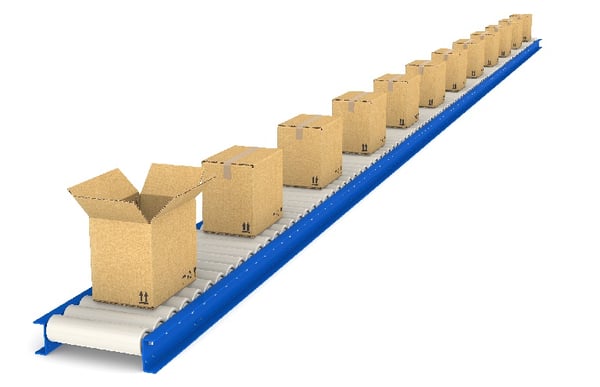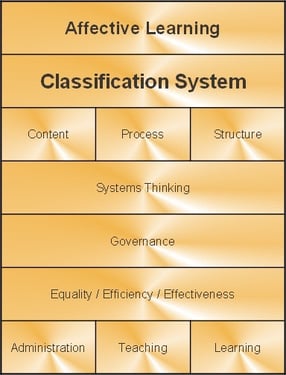Published on
Universal Classification of Knowledge in Education and Training

Conventional education is reflective of an industrial model based on standardization and competitiveness where intellectual diversity is the premise for selecting workers for various parts of the economy. Because such a model is based on an erroneous view of human potential, it is very political, and artificial uniqueness is required to sustain it.
It is this artificial uniqueness that creates all the problems for information-based education and training which transcends politics. People can no longer be controlled by restricting what they can know. Our schools, colleges and universities exist to feed a model of society that is redundant and we wonder why so many people are falling through the cracks. But can the system change itself by relinquishing the very foundation on which it is built? It is a dilemma.
That is the reality that we must confront if we want to change education for the better. But we can fix the problem by standardizing the way we learn, not by standardizing what we learn. We need to unify the structure of knowledge and the process of learning and get away from standardized content as the driving force of education. We can still have some standardized content for initial certification purposes, but knowledge is constantly changing and in order to keep up with it we must focus first on how we know rather than what we know. Educational content will always be a variable and if we organize from a content perspective, we will always have artificial uniqueness.
In my article “Affective Learning Projects”, I described how to use the nine elements of the learning process as reference points for developing learning projects. If we also use this reference system to organize knowledge, then we will have a standard way of describing knowledge in terms of the way we use it. While there are many ways to describe a given project, the general idea and the reference points can always be the same. We do not need to standardize the content itself, just the general perspective and the process of learning.
We need uniqueness at the learning level, but we do not need it at the classification level. This is why meaningful standardization of content can never happen, but standardization of process can. If we stand back far enough, we can see the elements of the learning process that we all have in common – accessing information, valuing knowledge, expressing ideas, building language, gaining perspective, garnering attitude, planning strategies, manipulating resources, and assessing quality. We can use those standard reference points for designing curriculum, for teaching and for learning. We can also use them to classify knowledge and provide a universal reference system for governance. This is the foundation for the building and maintenance of affective learning e-schools.
The detail of human knowledge is beyond comprehension and it is proliferating exponentially. We can’t know everything, and we all want to know things in our own way. The content of each mind is unique. Standardization at this level, if it was possible, is counterproductive to human nature.
Process
The human brain is a consistently functioning organ of our bodies just like all the other organs and it functions in the same way for everyone. We do not understand this function as well as we understand other organs, but we know that it is a process of neuron development that reflects what is happening around us through some form of energy exchange. I generalize this process from a learning point of view using the nine elements described above.
Structure
We also know that the brain has a layered cortex and it is believed that each layer of the cortex plays a role in its organization of knowledge. Again we do not fully understand it, but each layer is likely responsible for levels of hierarchical thinking. I describe this as the sensing level, the learning level, the using level, the organizing level, the personalizing level, and the proliferation level. In terms of knowledge, this is reflected as sensory energy, incremental stages of development, services, specializations, sectors and styles. This hierarchy is illustrated in the article “Teaching as Knowledge Management”.
Systems Thinking
In addition to process and structure, our brains function systematically. Systems thinking enhances language and enables us to understand complex ideas. In effect, our brains create mental models that provide the frameworks (affective learning systems) through which we live our lives.
Governance
If we are ever going to have high quality education systems that meet the needs of everyone, we have to govern it from the perspective of the way the brain processes information. While knowledge about knowledge is in its infancy, we must recognize that it is there and begin to use it. As we do, we will learn more and more and feel confident in building policy around it.
Equality, Efficiency and Effectiveness
When we use affective learning systems to organize knowledge, the advantages are immediately evident. We start looking at everyone as having enormous capacity for learning and we get away from competitive comparison. It becomes redundant. The efficiency and effectiveness of teaching and learning is not seen as a function of time on task, but more in terms of the quality of the learning experience.
Administration
From an administrative perspective, we will be able to ascertain why learning is not happening and make interventions to correct the situation. Faddish cycles and artificial uniqueness become redundant. We will be able to rationalize our policy, move ahead, and fix our mistakes as we go, always improving the quality of education through the continuous improvement of affective learning e-schools. Of course, it will also be much easier to direct funding where it is needed the most.
Teaching
Affective learning e-schools will enable teachers to become true professionals with a common mental model for educating. The advantages of this are mind boggling in terms of how teachers will influence their students and unlock true potential that all students possess. Imagine a world where everyone are confident in teachers who are allowed to make education work unrestricted by the artificial barriers put in place to control the educating process.
Learning
Affective learning e-schools will provide a common approach to learning and enable learners to learn how to learn. People will lose the uncertainty that we now associate with learning and develop the confidence that they can learn whatever they want without being compared to others. Intellectual diversity will be seen as a positive quality and valued more than intellectual competitiveness.
This is the way all education should be especially in colleges and universities. It is only when we begin to respect the infinite abilities that each and every one of us possesses will we have a truly understanding society respectful of everybody, working together for the benefit of all. The structure of knowledge described in the article “Teaching as Knowledge Management” is a universal classification system that can be used to eliminate artificial uniqueness and achieve this necessary revolution in education and training.
Author Perspective: Business




